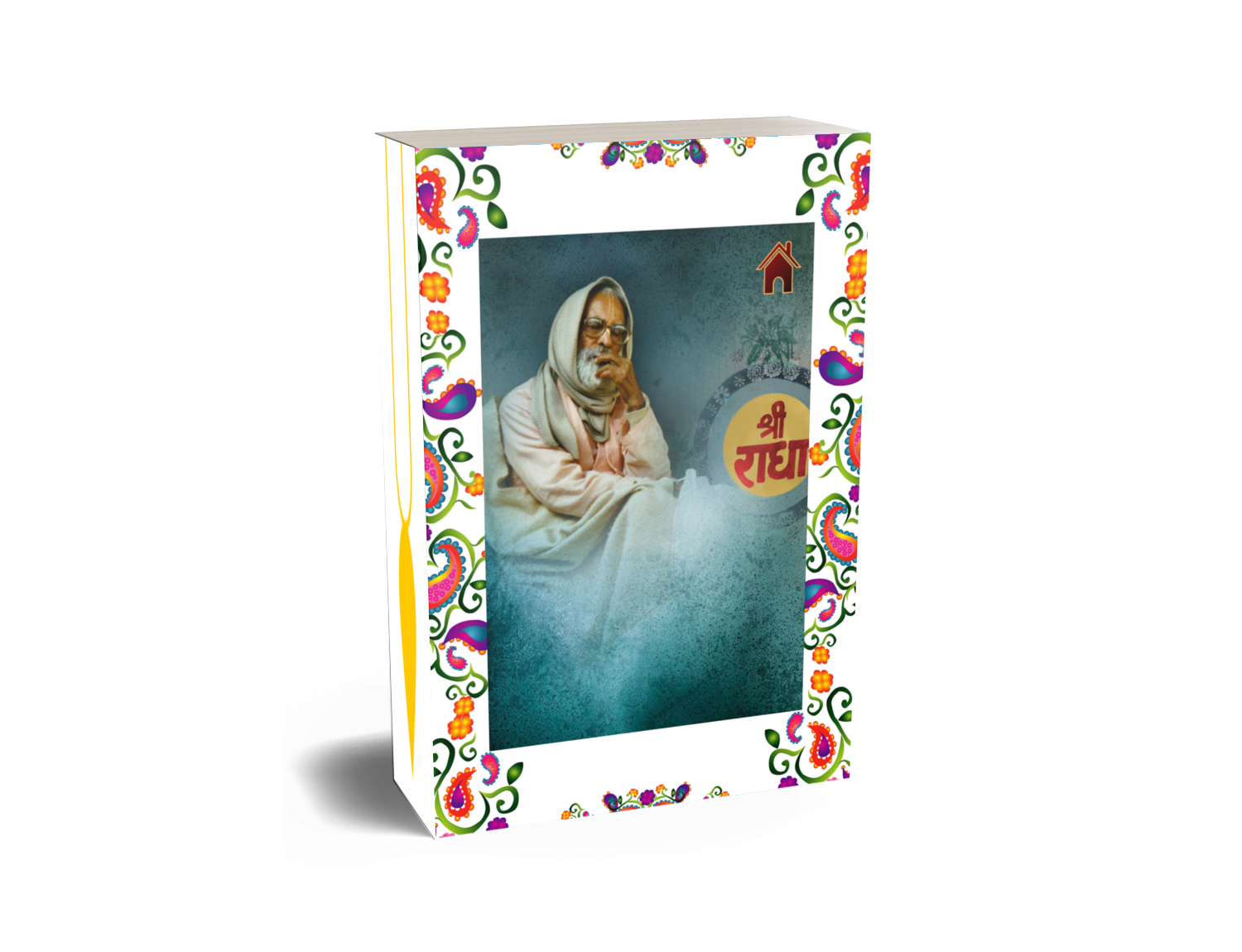

Chapter 4 from the book, Going Beyond Vaikuṇṭha, 4th edition by Śrīla Bhaktivedānta Nārāyaṇa Mahārāja
Although Gopa-kumāra had arrived in Vaikuṇṭha-dhāma, his heart did not feel satisfaction 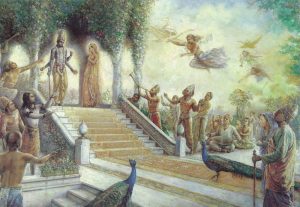 there. I had a similar experience recently in Bombay. We had been invited to stay in the home of a wealthy gentleman there, and upon entering his home, I could not find my way around that place, really. They had a very beautiful floor that was shining like a mirror, and I actually became confused, just as Duryodhana became bewildered in the assembly house of Yudhiṣṭhira Mahārāja. Mahāprabhu and His devotees would not go to the house of any king because the lust of worldly people can be very contaminating. Seeing their opulence, we will begin thinking, “My home should be like this,” “My āśrama should be like this.” Then, not being able to acquire such things, this lust will intensify within us. So instead we left and stayed in the home of an ordinary family.
there. I had a similar experience recently in Bombay. We had been invited to stay in the home of a wealthy gentleman there, and upon entering his home, I could not find my way around that place, really. They had a very beautiful floor that was shining like a mirror, and I actually became confused, just as Duryodhana became bewildered in the assembly house of Yudhiṣṭhira Mahārāja. Mahāprabhu and His devotees would not go to the house of any king because the lust of worldly people can be very contaminating. Seeing their opulence, we will begin thinking, “My home should be like this,” “My āśrama should be like this.” Then, not being able to acquire such things, this lust will intensify within us. So instead we left and stayed in the home of an ordinary family.
In Bombay, there are even people who are millions of rupees more wealthy than that gentleman who had 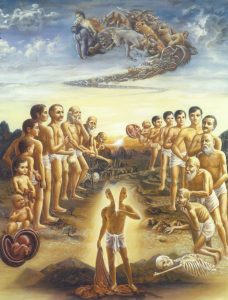 invited us. Therefore, what can be said of the enjoyment available in the heavenly planets? We cannot comprehend such opulence. If we were to go there, we would forget everything of this world. So if we were to go to Vaikuṇṭha, what would we find? There the opulence is even greater. There is such an abundance of happiness there that anyone who enters Vaikuṇṭha will never have a desire to leave. There is so much beauty, and no one ever becomes old or diseased. There is no birth and no death, whereas in heaven there is. Up to Mahar, Jano, Tapo and Satyalokas there is birth and death, but there is no trace of them in Vaikuṇṭha. There is always new and fresh happiness, and opulence of the highest standard. Even the soil there is cinmaya, transcendental.
invited us. Therefore, what can be said of the enjoyment available in the heavenly planets? We cannot comprehend such opulence. If we were to go there, we would forget everything of this world. So if we were to go to Vaikuṇṭha, what would we find? There the opulence is even greater. There is such an abundance of happiness there that anyone who enters Vaikuṇṭha will never have a desire to leave. There is so much beauty, and no one ever becomes old or diseased. There is no birth and no death, whereas in heaven there is. Up to Mahar, Jano, Tapo and Satyalokas there is birth and death, but there is no trace of them in Vaikuṇṭha. There is always new and fresh happiness, and opulence of the highest standard. Even the soil there is cinmaya, transcendental.
kalpa-taravo drumā bhūmiś cintāmaṇi-gaṇa-mayi toyam
amṛtam kathā gānaṁ nāṭyaṁ gamanam api
Brahma-saṁhitā (5.56)
The trees there are desire trees (kalpataru), and the land is touchstone (cintāmaṇi). The water is nectar, the talking is singing and the walking is dancing – this is the nature of Vaikuṇṭha. But Gopa-kumāra was feeling dissatisfied there, and Nārada said to him, “This is a very grave matter. Here I see that your face is withered in worry. How is this possible? Coming here, no one can remain unhappy, but I see that you are. What is it – is there anything you are lacking, or is something else making you unhappy? What is it?”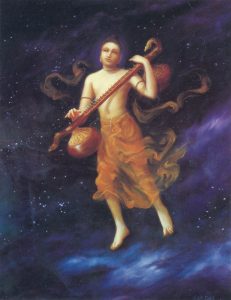
Such unhappiness will not be felt by everyone there, but only by a special person. If for any reason someone is unhappy there, they won’t be able to express it to anyone. Such intense unhappiness cannot be expressed even to your mother, father, brother or sister, but only to a bosom friend. By some means he will remove the thorn, and he will understand your feelings. Nārada can see inside all souls; he knows everything. With his eyes closed in meditation, he ascertained the reason for Gopa-kumāra’s unhappiness and became very pleased. Why is it that seeing such unhappiness in another he became pleased? There is one related story in this connection.
When Uddhava went to Vṛndāvana, he saw that Nanda Mahārāja was wailing in lamentation, crying for Kṛṣṇa. Kṛṣṇa was such a wonderful son, but now leaving Nanda behind, He had gone away. Nanda was very unhappy, but what was Uddhava thinking? “Today, I am supremely fortunate to have received the darśana of such an exalted personality who is actually crying for Bhagavān.” In the materially conditioned state of life, everyone is crying for themselves. All for themselves. When a brother dies, for whom is the family crying – for the brother or for themselves? It seems that they are crying for the brother, but really they are not. “If my brother had lived, then he would have given me all sorts of help. Now I am helpless” – this is what they are really crying about. “Father has died; if he had lived, then very easily all of our desires would have been fulfilled.” “My wife has died; she was very beautiful and a great servant. Seating us comfortably, she would serve us food, water and everything. Now she is gone,” and the husband is left crying, but is he really crying for the wife? Really he is crying for himself.
So if in any situation a father is crying for a son, we can understand that actually he is crying for himself. But what Uddhava had witnessed was Nanda Bābā really crying for Kṛṣṇa, not for himself – such deep kṛṣṇa-prema was inside him. We should also aspire to be a little like this. If even one time we shed a tear that is actually for Bhagavān, then our lives will be meaningful. But our hearts are not yet melted, and therefore while chanting the holy name our hair does not stand on end. Mahāprabhu Himself said (Śrī Śikṣāṣṭaka 6):
nayanaṁ galad-aśru-dhārayā
vadanaṁ gadgada-ruddhayā girā
pulakair nicitaṁ vapuḥ kadā
tava-nāma-grahaṇe bhaviṣyati
O Lord, when, while chanting Your name, will tears flow from my eyes like waves? When will my voice tremble in ecstasy and the hairs of my body stand erect?
What is the meaning of the word bhaviṣyati? When will that opportunity come that one day, while chanting harināma, tears will come from our eyes in a continuous flow that will never stop? When will we be trembling and feeling our heart melting, sometimes rolling on the ground, sometimes laughing, sometimes crying and sometimes singing? Uddhava witnessed all of this and thought, “Today I am so fortunate to have the darśana of such a great personality. But what will I say: ‘You are the most fortunate person?’ I am unable to say that. Should I tell him to go on crying, or should I try to console him and tell him not to cry? In this world, if a man is crying for Kṛṣṇa, that is actually desirable! I desire to have sentiments like that also! If he is really crying in kṛṣṇa-prema, he is the most fortunate person, but how can I say anything? ‘Cry’ or ‘Don’t cry’ – I cannot say either of those things. What can be done… .”
So Uddhava could not speak even one word to Nanda Bābā. Seeing the divine ecstasy of Nanda Bābā, Uddhava felt that on that day his life had become successful. And a similar sentiment came into the heart of Nārada upon seeing the condition of Gopakumāra. “You are so very, very fortunate. Even here in Vaikuṇṭha you 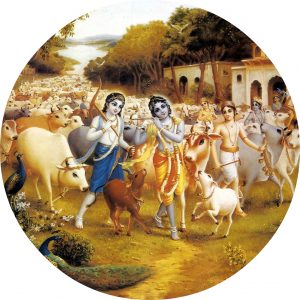 are unhappy because you want Nārāyaṇa to be Kṛṣṇa. You want to take the cows out to graze with Him, and you want to live with Him. You want to put your arms around Him and embrace as friends. You want Kṛṣṇa to say, ‘Hey, Gopa-kumāra, bring the cows over this way! The cows are thirsty, give them some water!’, and with great love you will follow the order of Kṛṣṇa. You want that sometimes Kṛṣṇa will embrace you, and sometimes you will embrace Him. That you will eat together, and even with unclean hands you will place food into each others’ mouths. That sometimes, when Kṛṣṇa is sleeping on the bed of Yaśodā, you will arrive at His bedside with your body covered with the dust of Vṛndāvana and say, ‘Hey, don’t sleep now! The cows have arrived at the door. Let’s go!’ You want to do all of this, and it can be very easily achieved as a sakhā.
are unhappy because you want Nārāyaṇa to be Kṛṣṇa. You want to take the cows out to graze with Him, and you want to live with Him. You want to put your arms around Him and embrace as friends. You want Kṛṣṇa to say, ‘Hey, Gopa-kumāra, bring the cows over this way! The cows are thirsty, give them some water!’, and with great love you will follow the order of Kṛṣṇa. You want that sometimes Kṛṣṇa will embrace you, and sometimes you will embrace Him. That you will eat together, and even with unclean hands you will place food into each others’ mouths. That sometimes, when Kṛṣṇa is sleeping on the bed of Yaśodā, you will arrive at His bedside with your body covered with the dust of Vṛndāvana and say, ‘Hey, don’t sleep now! The cows have arrived at the door. Let’s go!’ You want to do all of this, and it can be very easily achieved as a sakhā.
“But what does Nārāyaṇa do? When you go before Him, He lifts His right hand in bestowal of blessings: ‘May all auspiciousness be upon you.’ Saying ‘Namo nārāyaṇa, namo nārāyaṇa,’ everyone is offering praṇāma to Him. He lifts His hand and gives this blessing: ‘You will be fearless. All good fortune shall attend you.’ You want to race to embrace Him, and you want to play the flute with Him, but you are not able to do any of this. You desire to sleep on the same bed with Him at night, but by cleverness and trickery, or by some other means, Lakṣmī-devī sends you away. And when you don’t leave, what does she do? She calls the doormen Jaya and Vijaya and says, ‘He is not obeying me,’ and she has you removed. When you sing, ‘Śrī Kṛṣṇa! Gopāla! Hare! Mukunda! O Govinda! O Nanda-kiśora! O Kṛṣṇa! O Śrī Yaśodā-tanaya! O Śrī Ballavījīvana! O Rādhikeśa! Be merciful to me!’ and play the flute and express a desire to take the cows out to graze, all the residents of Vaikuṇṭha abuse you and say, ‘Hey, what are you saying? Nārāyaṇa, Prabhu, the Controller of the controllers of all the worlds – you are calling Him Gopāla and say that you will take cows out to graze together? Do you want to make Him the guardian of cows? You say that He milks cows, that He is the lover of some cowherd women, and the son of a milkman? You say that, entering the home of a milkman together, you and He will steal yoghurt and sweets? You call Him a thief? You are disreputing Him! You should be saying that He is Viṣṇu, who possesses thousands of heads! You should be glorifying Him in the form in which He gives blessings and good fortune to all. How can you say that He is a milkman, a thief and a liar? You shouldn’t do this.’ Saying this, they all make jokes and laugh at you.
“Some say, ‘My friend, it’s true that Nārāyaṇa became Kṛṣṇa and for His own pleasure and the amusement of His devotees He performed some pastimes, but those pastimes are not important. This is Vaikuṇṭha, not Vraja. You shouldn’t speak of such things here.’ Hearing them speak like this, you constantly feel ashamed.”
Suppose a cowherd boy such as Śrīdāmā or Subala were to go to Dvārakā to see Kṛṣṇa. They would see that 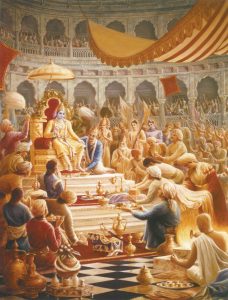 Kṛṣṇa is seated there in the royal Sudharmā assembly house as Dvārakādhīśa, the Mahārāja of Dvārakā. Ugrasena, Vasudeva and all the elders of the Yadu dynasty are seated at His right side. Garga Ṛṣi and many other eminent sages are seated in front of Him. His sons Sāmba, Aniruddha and Pradyumna are seated at His left side, and behind a curtain are Rukmiṇī and Satyabhāmā, along with Devakī and the other queens. Now if some cowherd boy arrives in that assembly, how will he appear? In cowherd dress, with a bent stick in one hand for guiding the cows and a bamboo flute in the other. It will be early evening, and having just returned from taking the cows out for grazing, he will be very dusty and in need of changing his clothes. If he arrives in that assembly, he will want to embrace Kṛṣṇa, but Kṛṣṇa will only sit quietly, glancing at the gopa only once and not again.
Kṛṣṇa is seated there in the royal Sudharmā assembly house as Dvārakādhīśa, the Mahārāja of Dvārakā. Ugrasena, Vasudeva and all the elders of the Yadu dynasty are seated at His right side. Garga Ṛṣi and many other eminent sages are seated in front of Him. His sons Sāmba, Aniruddha and Pradyumna are seated at His left side, and behind a curtain are Rukmiṇī and Satyabhāmā, along with Devakī and the other queens. Now if some cowherd boy arrives in that assembly, how will he appear? In cowherd dress, with a bent stick in one hand for guiding the cows and a bamboo flute in the other. It will be early evening, and having just returned from taking the cows out for grazing, he will be very dusty and in need of changing his clothes. If he arrives in that assembly, he will want to embrace Kṛṣṇa, but Kṛṣṇa will only sit quietly, glancing at the gopa only once and not again.
That poor fellow would have come with such high expectations: the expectation that “Kṛṣṇa, by His quality of bhakta-vātsalya, possessing special affection for His devotees, will call me to come and sit near Him.” But that would not happen there. Instead, someone would say to him, “My friend, step this way.” Then the cowherd boy would see all of the opulence there and think, “Oh! Look at this umbrella, and look at this cāmara! Look at all of these people!” Then he would look at himself, feel ashamed, and go away from there. In that place Rukmiṇī, Satyabhāmā and the other ladies are decorated with ornaments as queens, so what would happen if an ordinary lady with flowers in her hair and wearing no costly jewellery went there? Therefore the gopīs never go there because they would not be respected.
Nārada was thinking, “This Gopa-kumāra has such a high position that he considers Kṛṣṇa his dear friend, so he will never be satisfied here in Vaikuṇṭha. His eternal identity (svarūpa) will not be recognised here; its full glory will not be realised.” If any of us are ever fortunate enough to attain the svarūpa of a gopa or a gopī, then if we were to go to heaven or Vaikuṇṭha, we also would not like it there. Perhaps Nārada would come to us, ascertain our internal state, and think to himself, “She is special. She is a servant of Rādhikā.” But he wouldn’t tell anyone; he would just silently offer respects. He would understand that our eternal identity is not right for that place; the guru can always understand.
Similarly, Nārada saw the internal sentiment of Gopa-kumāra, understood the situation, and became very pleased. Then, after thinking about what to say and what not to say, he said, “Hmm… after taking your pulse, I’m thinking that the disease you have is not an ordinary disease. The cure for it cannot be found in Vaikuṇṭha; there is no medicine for it here. And by staying here, the disease will only increase. But I will now tell you how your disease may be cured. You require affection that is free of all reservations. This is called viśrambha-bhāva, the mood of intimacy. In Vaikuṇṭha, there is only sambhrama-bhāva.”
In Śrī Caitanya-caritāmṛta (Ādi-līlā 4.17) it is said:
aiśvarya-jñānete saba jagat miśrita
aiśvarya-śithila-preme nahi mora prīta
In Vaikuṇṭha there is prema, but it is weakened by Bhagavān’s servants’ awareness of His majesty, aiśvarya. They are serving Him with awareness of all of His opulences, and therefore they are a little fearful. Śrī Rāmacandra is seated on a bed, and Hanumān is seated below. Crouching down, on cold days he will massage the feet of Rāmacandra and cover the Lord with a quilt. He is serving with love and Bhagavān is pleased, but there is a more intimate type of prema, called viśrambha. The prema of Jaya, Vijaya and Lakṣmī-devī is not viśrambha; it is sambhrama, which means that they are aware of their own insignificance and therefore feel a little fearful. Bhagavān is not fully satisfied by this type of service, but if we try to serve Him with the mood of viśrambha in our conditioned state, it will be offensive, although it is written in the scriptures, “viśrambhena gurau sevā – in the mood of intimacy we should serve the spiritual master.” Here the purport of viśrambha is that we should understand the guru to be a friend and serve him as we would our mother, father, brother or friend.
When a friend of your family comes to your house, you will not need to be told, “Your friend has come; offer him a nice sitting place and bring him something to drink.” Automatically you will do it. Therefore, the topmost (uttama) servant will understand his guru’s desires and automatically act to fulfil them without receiving any specific order. Serving without having to be told – this is a symptom of the servant. One who serves his guru after being told is an intermediate (madhyama) servant. Then there is one other type of servant to whom the guru will  say, “Go send for such-and-such Mahārāja.”
say, “Go send for such-and-such Mahārāja.”
This servant will answer back, “But Gurujī, now it is early evening and it is becoming dark.”
The guru knows it is becoming dark, but he has given his order. “It doesn’t matter if it is dark; just go!”
Then this servant will say, “But Gurujī, on the road there are many dogs.”
“Never mind that – take a stick with you and go!”
“But what if I go and Mahārāja is not there; then what will I do?”
What can such a servant do? From the word sevaka, meaning ‘servant’, remove the se and that leaves vaka. Vaka means ‘a crane’, a hypocritical devotee. The crane stands in the water on one leg as if he were a great renounced devotee in meditation. But as soon as a fish swims by, he will snatch it and eat it and then return to his pose. Therefore the uttama servant is a real servant, and in a general way we can also call the madhyama servant a real servant, but one who is argumentative is not a servant at all.
If we don’t understand the heart of the guru, then how will we understand the heart of Kṛṣṇa? Therefore, those people who desire to go beyond Vaikuṇṭha should serve their spiritual master with viśrambha love. If someone is hiding something from his guru, and before his guru his heart is not open, then how will he be able to go before Bhagavān? This is the very foundation of śikṣā, instruction: by honestly serving the guru we will learn.
Nārada Ṛṣi observed that, “This Gopa-kumāra is certainly a viśrambha-sevaka, and therefore Vaikuṇṭha is not tasteful to him.” Therefore Nārada will now start explaining higher tattva to him. “Look, here in Vaikuṇṭha everything is cinmaya, and here Bhagavān has thousands of forms.”
What is the meaning? There are many forms of Varāha, many forms of Mīna, and many forms of Kurma, Nṛsiṁha, Vāmana, Paraśurāma and all other incarnations. It is generally understood that there are twenty-four types of līlā-avatāras, but there are not merely twenty-four. There are so many that They cannot possibly be counted. But one incarnation is not different in quality from another incarnation. They are residing in different chambers of Vaikuṇṭha, and all of Them are eternal. Yes, Bhagavān is one, but He appears according to the gradation of the bhakti of His devotees. The same one Bhagavān will be seen differently according to the nature of one’s bhakti.
On the banks of the Yamunā at Kāliya-hrada in Vṛndāvana, a sage named Saubhari Ṛṣi was performing austerities for ten thousand years. But because Garuḍa was coming there and eating fish, Saubhari Ṛṣi became angry and cursed him. Due to this offence, material desire arose within Saubhari Ṛṣi. Next, by his mystic power he assumed fifty forms, married the fifty daughters of Māndhātā Muni, and created fifty palaces with fifty gardens. He arranged them in such a way that they would put Indrapurī to shame with their extensive facility for enjoyment, and he lived like that for the next ten thousand years. His grandchildren and great-grandchildren had all grown up, and one day Māndhātā Muni came there and said, “I have lived without my daughters for so long that now they don’t even remember me, and they have no desire whatsoever to come to their father’s house. What has happened?” Then he looked around and thought, “There is such opulence here! This is why my daughters have no desire to ever return to visit my home.”
These fifty forms that Saubhari Ṛṣi assumed were kāya-vyūha forms. When he would lift his hand, all the forms lifted their hand. In kāya-vyūha expansions, if the original speaks, then all will speak. If he sleeps, then all will sleep. If he moves, then all will move. One form is real, and the rest are copies. But Bhagavān’s incarnations are not like this. All of His forms are independent.
There is one special point concerning the opulence (aiśvarya) of Dvārakā, and the sweetness (mādhurya) of Vṛndāvana. In Dvārakā, Kṛṣṇa marries sixteen thousand queens. In one palace He is playing dice, somewhere else He is giving cows in charity to a brāhmaṇa, somewhere else He is performing a marriage ceremony, in another palace He is performing a fire sacrifice, and in other palaces He is engaged in other activities. All of His forms appear the same as His original form and there is no difference in quality between Them. Here, by aiśvarya Kṛṣṇa has manifested into many, many different forms, but all of Them are one in that all are all-powerful and full in all opulences. Each queen is cooking and offering Him preparations, and in one palace He is eating dahl and purī, in another palace He is eating a rice preparation, in another palace He is eating sabjī, in another palace He is eating pakorās, and in another palace He is eating sweet-rice. By aiśvarya, as the possessor of all potency (śakti), in Dvārakā Kṛṣṇa expands into many, many forms, and all the forms are real and independent.
But what happens in Vṛndāvana? It is not a land of aiśvarya, opulence. There, over and above opulence is mādhurya, sweetness. How can we understand this clearly? In Vraja there are not just sixteen thousand gopīs, but millions; and between every two gopīs is one Kṛṣṇa, or between every two Kṛṣṇas is one gopī. It appears like this. Here we mustn’t even imagine that this is done by aiśvarya; it is mādhurya. What is the meaning of mādhurya? That which is suitable for His pastimes in human form, nara-līlā. And that which is opposed to nara-līlā is aiśvarya. For example, upon seeing the Universal Form of Kṛṣṇa, Arjuna became astonished and said, “By calling You ‘friend’ I have committed a great offence. In the future I will never again call You ‘friend’, and never again make You the driver of my chariot. I have committed a great offence.” This was aiśvarya-buddhi, awareness of Kṛṣṇa’s majesty, and was not suitable for nara-līlā.
After witnessing Kṛṣṇa’s killing of Kaṁsa, Vasudeva and Devakī forgot about lovingly feeding Him milk. This is 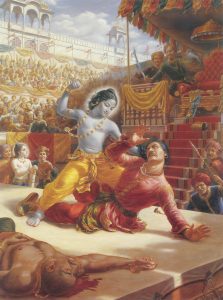 another type of sentiment that is not suitable for Kṛṣṇa’s nara-līlā, and therefore it is aiśvarya. But in Vṛndāvana, when Kṛṣṇa lifted the massive Govardhana Hill, Yaśodā felt proud and thought, “Today our son lifted Govardhana!” but the feeling that Kṛṣṇa was her son did not leave her. Kṛṣṇa exhibited His opulence of being all-powerful in lifting Govardhana, but the sentiment that Kṛṣṇa was her son never left her heart, and she simply thought, “My son is so strong, there is no one in the entire world stronger than Him!”
another type of sentiment that is not suitable for Kṛṣṇa’s nara-līlā, and therefore it is aiśvarya. But in Vṛndāvana, when Kṛṣṇa lifted the massive Govardhana Hill, Yaśodā felt proud and thought, “Today our son lifted Govardhana!” but the feeling that Kṛṣṇa was her son did not leave her. Kṛṣṇa exhibited His opulence of being all-powerful in lifting Govardhana, but the sentiment that Kṛṣṇa was her son never left her heart, and she simply thought, “My son is so strong, there is no one in the entire world stronger than Him!”
In the confusion of divine separation, the gopīs were speaking to a bee: “O messenger, we will never have an intimate relationship with Kṛṣṇa. Never at any time, because He is very crooked, a big liar and very deceptive. We will never trust Him, and we will never be able to establish any friendship with Him. Why? He is Bhagavān, isn’t He? Paurṇamāsī has told us that He is Bhagavān, and we have faith in that. In His previous birth He was Rāma. He has now appeared with a similar beautiful, dark complexion; that hasn’t changed. He is supposed to be a great renunciant and never controlled by a woman. Yet overpowered by a woman, His wife, He went with her to the jungle. He had all the marks of a sādhu and wore the dress of a sādhu, and yet went to the jungle with His wife. His wife said, ‘Ārya-putra, there is a deer as beautiful as gold; please catch it for me, and then we will take it to Bharata. If You cannot catch it alive, then after killing it with Your arrow, from its skin we will make a beautiful seat suitable for the king’s throne. Sitting upon it, Bharata will be greatly pleased, and in the future You will also sit there.’
“Lakṣmaṇa at once said, ‘That deer form is the deceptive magic of a demon: please don’t go,’ but Rāma didn’t honour what Lakṣmaṇa said. He claimed that He would never be overpowered by a woman, yet whose words did He honour? His wife’s, and He came under her control. That’s the kind of person He is. Then another woman came and He cut off her nose and ears! She came begging for prema and prepared to give Him everything – was there any fault in that? Rāma appeared to possess all the beauty of the three worlds, so considering the general nature of the female class, there was certainly no fault in her! But what did He do? He cut off her nose and ears. Also, He killed Vāli (the brother of Sugrīva) from a hidden position instead of fighting directly in front of him.
“We have also heard about what He did to Bali Mahārāja. As Vāmanadeva He asked for three steps of land, 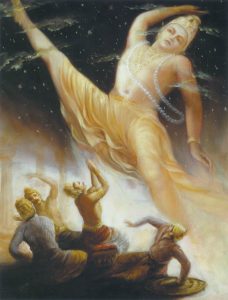 and Bali was prepared to give it. Then He assumed a massive form and snatched everything. The daughter of Bali said, ‘This is not the same form in which You asked for the three steps of land, so we shall not give it to You!’ Bali said, ‘It’s all right, let it be,’ but his daughter said to Bhagavān, ‘No, I will kill You! I will give You poison and kill You!’ and therefore she came later as Pūtanā to do just that. At first, being attracted by His beauty, she had desired to have Him as her son; but upon seeing His cheating ways, she then wanted to kill Him. Could she be blamed? Then Vāmanadeva bound up her father, even after He snatched away everything that came within the measurement of His three steps, just as a crow snatches a fragment of food and then kicks away the basket from which he got it! So we certainly cannot see eye to eye with kṛṣṇa.”
and Bali was prepared to give it. Then He assumed a massive form and snatched everything. The daughter of Bali said, ‘This is not the same form in which You asked for the three steps of land, so we shall not give it to You!’ Bali said, ‘It’s all right, let it be,’ but his daughter said to Bhagavān, ‘No, I will kill You! I will give You poison and kill You!’ and therefore she came later as Pūtanā to do just that. At first, being attracted by His beauty, she had desired to have Him as her son; but upon seeing His cheating ways, she then wanted to kill Him. Could she be blamed? Then Vāmanadeva bound up her father, even after He snatched away everything that came within the measurement of His three steps, just as a crow snatches a fragment of food and then kicks away the basket from which he got it! So we certainly cannot see eye to eye with kṛṣṇa.”
The purport of what they were saying is that they knew that He was Bhagavān because they had faith in what Paurṇamāsī had told them. But in spite of knowing that He was Bhagavān, still His pastimes in human form were the dearest to them, and they became immersed in that loving sentiment. In the confusion of spontaneous love they were saying that they would never be able to have an intimate relationship with Him – this is an example of mādhurya-bhāva.
In Vṛndāvana, it appeared that Kṛṣṇa expanded into millions and millions of forms in the rāsa-līlā, but actually He didn’t assume more forms. Śrīla Viśvanātha Cakravartī Ṭhākura has explained in his commentary on Śrīmad-Bhāgavatam that there was only the one original form of Kṛṣṇa, and He danced with such speed and dexterity in the arena of the rāsa dance that sometimes He would appear here, sometimes He would appear there, and so each gopī thought that “He is dancing with me only.” Appearing like a stick that is burning on one end and being waved in a circle, with inconceivable speed and dexterity He was moving amongst them in the circular formation of the rāsa-līlā.
We have seen dancing actors in our village near Vārāṇasī who would perform for four or five thousand rupees. One of these dancers would stack pot after pot with plates between them on his head, and on top of everything would be a plate with many candles on it. Dancing in such a way that not even one item would fall, he would move with so much speed it was incredible. So if an ordinary man can dance like this, then how can Kṛṣṇa dance? One and the same Kṛṣṇa was dancing amongst millions of gopīs at the same time with inconceivable speed and dexterity. This is mādhurya: what is suitable for nara-līlā, His human-like pastimes. He assumes separate forms in Dvārakā by aiśvarya, but in Vṛndāvana it was not kāya-vyūha, incarnations or expansions but the same one Kṛṣṇa moving amongst the gopīs, causing each gopī to think, “He is dancing with me only.”
This mādhurya is not present in Vaikuṇṭha, so Gopa-kumāra was not satisfied there. After taking his pulse, Nārada said, “It is a great thing that you desire; therefore I must help you to understand the higher points of tattva. For going to Goloka, it is necessary to know all of this.”
Image/Art made possible by Pixabay.com & Krishnapath.org








